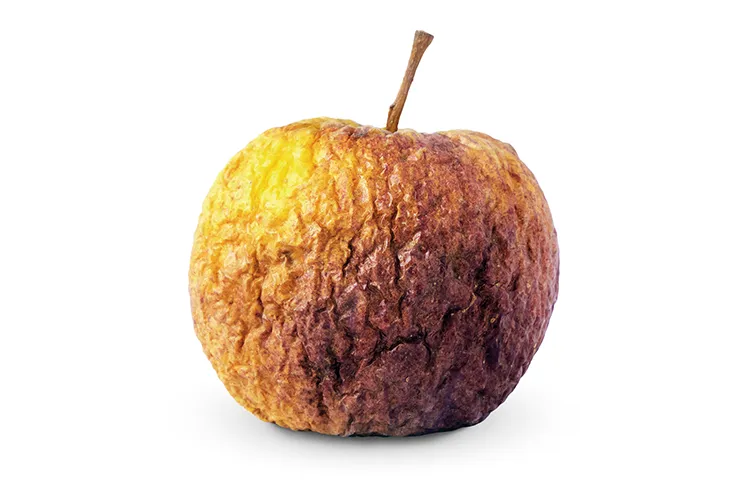


Andrew Brooks on how geographers must keep challenging false ideas and develop new, truthful theories
There were two outdated ideas from my 1990s secondary school geography classes that have long stuck in my memory. The first, from the physical side of the discipline, was the ‘shrinking apple’ thesis – otherwise known as ‘geophysical global cooling’. This theory was an alternative to the concept of plate tectonics. It posited that features such as mountain ranges were formed as the Earth cooled and shrank from an original molten state. Like a rotting apple, the surface of the planet was said to become creased and pockmarked with age. I vividly remember my geography teacher introducing this hypothesis alongside the already-established concept of continental drift. To give him his due, he barely concealed his contempt for the rotten idea. Nevertheless, we dutifully copied out a pair of circles from the blackboard. One was a map of the western hemisphere, showing the Mid-Atlantic Ridge and other tectonic plate boundaries. The second globe had a fuzzy pencil outline – like a perishing fruit – representing a contracting planet with a puckered surface.
The other archaic concept came from human geography and can be summed up by the expression ‘nimble fingers’. This was the idea that factory workers in developing countries – particularly Asian women – were naturally adept at completing repetitive tasks requiring dexterity. This supposedly inherent skill was said to give them a comparative advantage in manufacturing industries that mass-produced toys, clothing and electronics – all involving intricate, labour-intensive production regimes. This pseudo-science was used to justify low wages and exploitative labour conditions in emerging economies. Industrial manufacturing work was characterised as the natural role for these ‘factory girls’ – itself a problematic, gendered term, reinforcing the idea that such work was junior and feminine, despite many of these ‘girls’ being independent adults of all ages, and many men also working in factories.
The idea of an Eastern ‘nimble-fingered’ workforce is a racist discourse. There is nothing that makes Asian hands any more dexterous than anyone else’s. Nor should economic geography use such notions to justify limiting certain categories of people to particular livelihood opportunities. To do so is to enact what we would now call racial capitalism – an economic system based on the exploitation of people with marginalised racial identities.
Read more articles from Andrew Brooks…
Patterns of racial capitalism are easy to observe on a global scale. In the least economically developed countries – primarily in Africa and Asia – the majority of people work in agriculture and natural resource extraction. The food and raw materials they produce are sold in the global marketplace. In contrast, while Europe and North America are increasingly multicultural, most people of white-European heritage remain affluent by global standards and tend to work in the tertiary sector – in fields such as education, finance, healthcare, IT, law, retail, transport and services. These lifestyles are partially dependent on the extraction and production taking place elsewhere. This broad pattern largely reflects the legacy of European colonialism. It’s an outcome of political history, not inherent differences between peoples. To claim that certain social groups are physically or mentally suited to particular livelihoods – and that the global divide between rich and poor is somehow part of a natural order – is a racist worldview.
Racial capitalism doesn’t just operate at the global scale. It can be observed right here in British cities. In 1978, the Jamaican-born political theorist Stuart Hall wrote: ‘Race is the modality in which class is lived.’ In London, Hall’s words are borne out in sectors such as Uber driving, where the majority of drivers are migrant and racially minoritised workers. These are groups historically marginalised in the UK through racialisation, immigration policy and populist rhetoric. Ride-hailing is a new sector of the platform economy, powered by 21st-century smartphones – but it’s reproducing deeply ingrained racial capitalism. It harnesses modern technology while drawing on the precarious social positioning of already-marginalised groups to generate profit from the labour of the poor.
My secondary school teacher thought the shrinking apple thesis was junk – and his scepticism spread through the class. It’s a shame I wasn’t taught about Stuart Hall’s ideas instead of the nimble finger thesis. Today, I know that some of the best critical research into how racial capitalism persists is being done by geographers, including my colleague Dalia Gebrial, who analyses racial capitalism in the platform economy. Geography is a vibrant discipline where theories and concepts are always evolving. If you’re teaching or studying geography, be prepared to question established knowledge – and help make this a discipline committed to understanding both environmental change and social justice.




